Letter from James Buchanan to George Plitt
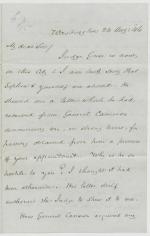



Alexander McClure writes fourteen letters to Eli Slifer, the Secretary of the Commonwealth under Governor Andrew Gregg Curtin, in which he discusses various Pennsylvania political issues, the potential Confederate invasion of Pennsylvania, possib

Governor Andrew Curtin writes eight letters to Eli Slifer, the Secretary of the Commonwealth, in which he reflects upon the recent political election in Philadelphia, his state of health, as well as communications with officers in the Union Army.
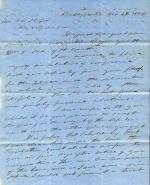
Governor Andrew Curtin writes eleven letters to Eli Slifer in which he offers him the position as Secretary of the Commonwealth, describes his preference for David Wilmot as Senator, recommends Wallace Kerr for the vacant clerkship in Slifer's o

James Sellers writes fifteen letters to Eli Slifer concerning help with managing his father's estate, the possibility of his election as Senator as a result of his affiliation with the Whig party, questions about the division of Union County, as w

John W. Killinger writes four letters to Eli Slifer discussing candidates for local elections as well as other political matters.
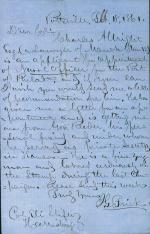
Jacob G.

Jacob C.
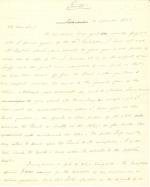
Senator James Buchanan writes four letters on a number of different topics, including Congressional legislation on bankruptcy, banks, the Tariff bill, the 1844 Democratic National Convention in Baltimore, and political conditions in Pennsylvania.

James Buchanan writes a total of six letters to Robert Tyler expressing his opinions on various contemporary political developments.
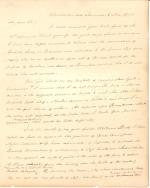
James Buchanan writes Robert P. Flenniken to discuss a number of political issues, including the 1852 Presidential election, the implications of General Lane's nomination in Indiana, and the intentions of Mr.
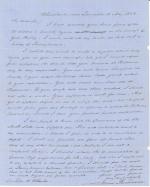
James Buchanan writes to Col John H. Wheeler regarding the 1852 Democratic National Convention, which is held in Baltimore, and who the delegates will select as the party's candidate for the 1852 Presidential election.
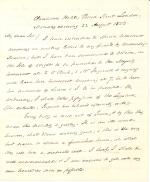
James Buchanan writes eight letters from London to James L.
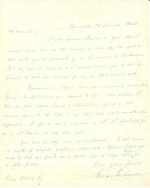
James Buchanan writes to Henry Welch regarding various political issues in Pennsylvania and Buchanan's chances of winning elections.
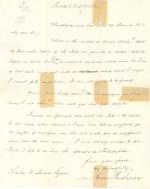
James Buchanan writes Charles H. Shriner regarding the status of the Democratic party in Union County, Pennsylvania. "What is the matter in Union County?," as Buchanan asks. Transcript included.
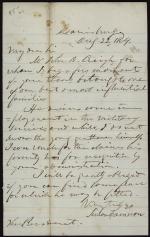
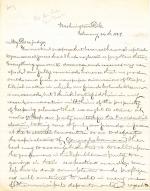
John W. Forney assures Pennsylvania Supreme Court Justice John Meredith Read that he both values and respects his opinions. Mr.
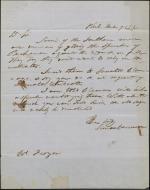
Simon Cameron writes to Reah Frazer, an attorney in Lancaster County, Pennsylvania, and requests copies of James Buchanan's speeches against the war, presumably the Mexican-American War.
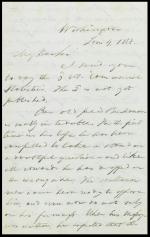
United States Senator Simon Cameron writes Samuel D. Ingham, a former United States Secretary of the Treasury, to discuss President James Buchanan and other national political matters.
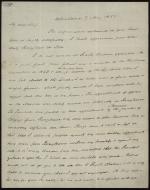
James Buchanan writes Robert Tyler, son of President John Tyler, about Buchanan's tenure as secretary of state under President James Polk and the Mexican War.
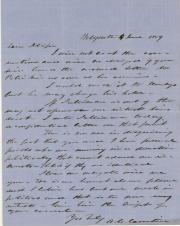
This collection consists of folders in 13 manuscript boxes relating to correspondence and papers of Eli Slifer (1818-1888), an active figure in Pennsylvania politics and the Secretary of the Commonwealth under Governor Andrew Gregg Curtin, 1861-1867. Most of the letters were written during the Civil War and represent the pressures of local politicians, office seekers, and military men upon the Governor's office. There is much material on the enlistment and acceptance of military companies dated 1861 (e.g. Wiliam Foote of the "Lycoming Mountain Ears"), on the operation of the draft law, 1862-1864, on the soldier's vote, election of 1864, and on military surgeons and hospitals. The collection contains 47 letters and telegrams from Curtin, 1852-1866, and 61 from Col. Alexander Kelly McClure, 1851-1866. The political power of Simon and William Cameron is reflected. The political influence of the German and English press appears in letters of Israel Gutelius and his family. Other subjects discussed include banking, transportation, coal, iron, oil industries, military contracts, and the invasion of Pennsylvania.
There is a series of appendices that arranges the correspondence by Civil War Units, Military Affairs, Political Affairs, Business Affairs, and Miscellaneous Affairs.
Note: Digital copies of some of these letters are available by following this COLLECTION LINK.